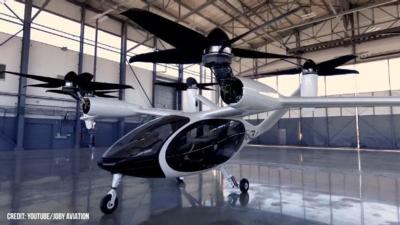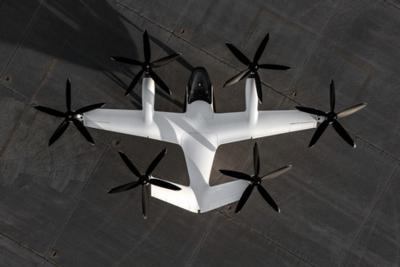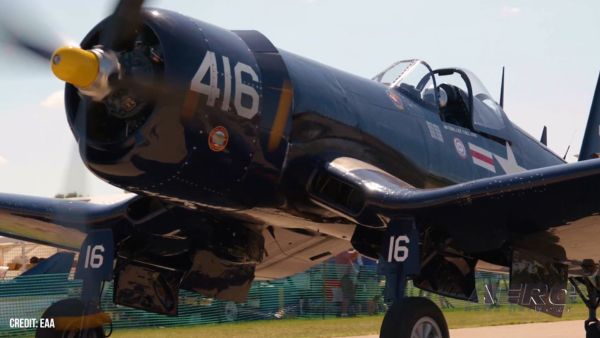A New Chapter in the Book of Joby
Joby Aviation, the Toyota-backed designer and builder of electric Vertical Takeoff and Landing (eVTOL) aircraft, announced that it has received FAA approval to commence flight-testing of its eVTOL air-taxi.

The Santa Cruz, California-based company set forth the FAA had granted a Special Airworthiness Certificate by which Joby is authorized to undertake a flight-testing campaign—sans passengers—of its first production prototype.
Moreover, Joby disclosed Toyota North America CEO Tetsuo Ogawa will presently take a seat on the company’s board.
Holding an estimated $400-million stake in the company, Toyota is Joby's largest external shareholder.
News of the imminence of Joby’s flight-testing program sent the company’s stock soaring 26-percent.
Joby aspires to see its eVTOL enter commercial, passenger-carrying service in 2025. Unlike competing eVTOL concerns, which look to sell their respective aircraft to airlines, leasing firms, and logistics companies, Joby plans to mass-produce its eVTOL and utilize a fleet of such to operate a piloted, on-demand air-taxi service—after the fashion of a ride-share app.
Upon FAA certification of its eVTOL, Joby will compete in a crowded market with rival developers the likes of Archer Aviation, Lilium, and Vertical Aerospace Ltd—the lot of which seek to revolutionize urban transportation.
The complexities of successfully bringing an eVTOL aircraft to market are evinced by a May 2023 letter from the aforementioned Vertical Aerospace to its shareholders, in which the company’s leadership stated: "We believe the industry as a whole will experience some timeline corrections and we are already seeing signs of peers acknowledging this.”
In 2022, German eVTOL-maker Lilium pushed back the certification deadline of its inchoate Lilium Jet from 2024 to 2025.
On 11 May 2023, Archer announced it had completed final assembly of the first full-scale specimen of its Midnight eVTOL and shipped the contraption from Archer’s Palo Alto facility to the company’s Salinas flight test installation. The subtext of success artfully conveyed by Archer’s announcement belies the fact the company was granted FAA approval to begin flight-testing its eVTOL platform in 2021.
Following the completion of initial in-air evaluations, Joby's eVTOL will be delivered to Edwards Air Force Base as part of the company’s $131-million contract with the U.S. Air Force’s Agility Prime program—an initiative the service launched in 2020 for purpose of experimenting, testing, and generally hastening the development of eVTOL for cross commercial and military use.
Joby’s Department of Defense (DOD) contract now includes a partnership with the U.S. Marine Corps, which will test the suitability of Joby’s eVTOL to non-combat missions such as resupply, relocation of personnel, and emergency medical response.

The whole of the U.S. military community has cast curious and covetous eyes upon eVTOL, the nimbleness, small size, and relative silence of which are eminently conducive to the stealthy, small-scale operations the Pentagon deems critical to short-term, near-peer conflicts. What’s more, the sense of environmental stewardship tacitly conveyed by their collective adoption of eVTOL’s is good for the optics of an Army, Navy, Air Force, and Marine Corps currently facing record-low recruitment numbers.
Presuming development proceeds apace, Joby’s eVTOL will come to market a piloted, four-passenger commercial aircraft with a single-charge range of 130-nautical-miles and a maximum speed of 174-knots. The electrically-powered, ostensibly zero-emission machine is designed to be one-hundred-times quieter than a conventional helicopter during takeoff and landing.
 Aero-News: Quote of the Day (04.28.25)
Aero-News: Quote of the Day (04.28.25) ANN's Daily Aero-Term (04.28.25): Decision Altitude (DA)
ANN's Daily Aero-Term (04.28.25): Decision Altitude (DA) ANN's Daily Aero-Linx (04.28.25)
ANN's Daily Aero-Linx (04.28.25) Airborne-Flight Training 04.24.25: GA Refocused, Seminole/Epic, WestJet v TFWP
Airborne-Flight Training 04.24.25: GA Refocused, Seminole/Epic, WestJet v TFWP Aero-News: Quote of the Day (04.29.25)
Aero-News: Quote of the Day (04.29.25)




